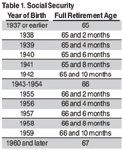
- General Dermatology
- Eczema
- Chronic Hand Eczema
- Alopecia
- Aesthetics
- Vitiligo
- COVID-19
- Actinic Keratosis
- Precision Medicine and Biologics
- Rare Disease
- Wound Care
- Rosacea
- Psoriasis
- Psoriatic Arthritis
- Atopic Dermatitis
- Melasma
- NP and PA
- Skin Cancer
- Hidradenitis Suppurativa
- Drug Watch
- Pigmentary Disorders
- Acne
- Pediatric Dermatology
- Practice Management
- Prurigo Nodularis
Article
On the horizon: Deciding when to collect your Social Security benefits is a highly personal matter
Author(s):
Whether your retirement is off in the distance or just over the horizon, eventually you will have to decide when to start drawing your Social Security benefits. That decision will have a significant effect on your financial future. The more you know about your options, the better your chance for making the decision that is right for you.

Key Points

Importance of timing

For help in determining when to start receiving retirement benefits, log on to the Social Security Administration's Web site at http://www.ssa.gov/retire2/applying1.htm.
Your need for current income will be a factor in deciding when to take benefits as well. If cash flow is such that you will need help in meeting current expenses when you retire, then signing up for benefits at the earliest time possible may be your best choice. However, if your financial situation is strong enough at retirement to meet expenses without the help of a Social Security check, you may want to delay receiving benefits in order to maximize your monthly payments.
Changing definition
The definition of retirement is rapidly changing. For many Americans, retirement means leaving a primary occupation in order to embark on a part-time or full-time secondary career. If you decide to start drawing Social Security benefits before you reach your FRA, (the Social Security Administration reports that approximately 73 percent of retired worker beneficiaries elect to begin collecting Social Security benefits before their full retirement age), every two dollars you earn above an annual limit ($14,160 in 2009) will reduce your monthly benefit check by one dollar.
In the year you reach your FRA, one dollar in benefits will be deducted for each three dollars you earn above a different limit, but only counting earnings before the month you reach FRA. For 2009, this limit is $37,680. Starting with the month you reach FRA, you will get your benefits with no limit on your earnings.
Whether it will benefit you to continue working after you begin drawing benefits is a complex question involving many variables. Your accountant or tax adviser can help you to decide. For more information on this, log on to http://www.nysscpa.org/cpajournal/2008/708/essentials/p48.htm.
Your spouse's needs
Delaying your benefits increases not only the size of your own monthly check but that of your spouse as well. This could be very important if your death would result in a sharp drop in your spouse's income. The financial security of a surviving spouse will be affected by such things as life insurance, the size of your estate, pension benefits and other related factors.
How dependable is it?
Despite rumors to the contrary, there are no plans to cut benefits for people close to or currently in retirement. Social Security's financial problems are very real, but they are long-term. Most estimates suggest that changes must be made by 2040 in order to avoid cuts in payments.
The major problems that need to be addressed over the long term are the aging population of baby boomers, the increasing life expectancy and a lowering of the worker-to-beneficiary ratio.
A personal matter
Is it better for you to start drawing your benefits early with a smaller monthly amount, or should you delay applying for benefits in order to qualify for a larger monthly payment? The answer depends on a number of variables, including your current cash needs, your own health and family longevity, whether you plan to work in retirement, whether you have other retirement income sources, your anticipated future financial needs and obligations, and, of course, the amount of your future Social Security benefit.
Obviously, it's important that you weigh all the facts carefully and consider your own circumstances before deciding when to begin receiving Social Security benefits.
Information in this article is provided for educational and reference purposes only. It is not intended to provide specific advice or inadividual recommendations. Consult an accountant or tax advisor for advice regarding your particular situation.
William Lynott is a former management consultant and corporate executive who writes about business and financial topics. Reach him at lynott@verizon.net
or at http://www.blynott.com/.
2 Commerce Drive
Cranbury, NJ 08512
All rights reserved.




